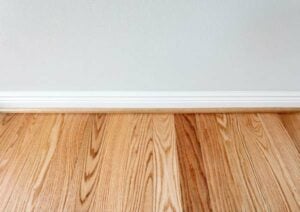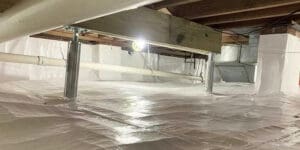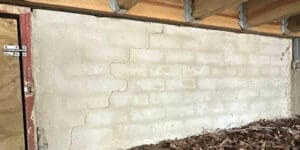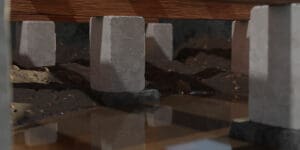Whether you live in an older home or you are considering buying one, the sight of a sloping floor is often a cause for concern. However, have you ever stopped to consider whether or not a sloping floor in an older home is truly something to worry about?
In this article, we’ll discuss some of the reasons why floors are more likely to slope in an older home. We’ll also reveal whether or not sloping floors are a serious problem, along with some ways that you can make sloping floors level once again.

Reasons Why Floors in Older Homes Slope

Generally, sloping floors are more commonly found in older homes than newer ones. The reason for this is that it typically takes a considerable amount of time for a floor to slope to the point that it is easily noticeable.
For example, some sloping floors are the result of accumulated damage or decay to the structural components that support the floor. This is especially true of wooden floors, as rotted joists and broken boards can all cause a floor to become unlevel.
However, there are many instances in which the cause of a sloping floor has nothing to do with damage to the floor itself. Instead, many sloping floors in older homes arise as a result of settling.
After a house is built, it is common for the soil below the house’s foundation to shift gradually over time. This is most prevalent when the soil has not been properly compacted, meaning that it has many small pockets of air within it.
Since the soil supports the foundation, and thus the rest of the house, if it shifts or sinks, the foundation will usually shift or sink to the same degree. A small amount of settling is to be expected, but some houses settle far more dramatically than others.
In many older homes, enough settling has occurred over the decades that the entire house has become uneven. The slope of a floor is often one of the easiest ways to recognize that unevenness.
An older home settling is not something that should cause concern on its own. Despite being uneven, a settled house is not necessarily structurally unsound–meaning that a sloping floor is also not necessarily something that should cause immediate concern.
But with that said, a sloping floor can also be a sign of foundation damage. A damaged foundation can cause a similar shifting effect as normal settling does. It can also result in sloping floors.
This means that a sloping floor alone is not enough to confirm that an older home has structural inefficiencies and that the average person can’t accurately evaluate a sloping floor on their own. Instead, consulting an expert professional is the best approach, as they can diagnose the underlying cause of your sloping floor and determine whether fixing it is necessary.
How Much Slope is Too Much?
We mentioned in the last section that the best way to evaluate a sloping floor is by consulting a professional. However, there are signs that anyone can look for which may indicate that a sloping floor should be fixed. These signs include stuck windows and doors, as well as cracks in walls, and stair step cracks in masonry, all of which typically indicate a deeper underlying problem.
When evaluating your sloping floor, one of the main factors to consider is the severity of the slope. Some floor slopes are so subtle that you might not notice them at all, while others slope significantly to the point that they become a tripping hazard.
With so many potential slopes that your floor can have, it’s helpful to keep a specific benchmark in mind to decide whether or not you should call in a professional for help. In general, if your floor slopes more than 1/2 an inch over a horizontal distance of 10 feet, then it’s likely you’ll need to repair it.
But while that ratio is a useful guide, answering the question of how much floor slope is too much is more a matter of personal preference. Simply put, if your floor slopes enough to cause you discomfort or concern, then you should have it repaired, regardless of what the specific slope ratio is.
What to Do About a Sloping Floor
If you decide that your floor is sloping enough to require a repair, the next step is to figure out what kind of repair is necessary. Remember that a sloping floor can occur due to one of several potential causes, each of which can call for a different solution.
For example, we mentioned earlier that some sloping floors result from damage to the floor itself or the floor’s supporting structures. In most cases, solving these kinds of sloping problems comes down to replacing the materials that have become damaged or decayed.
By contrast, if your sloping floor is the result of a foundation problem, then upgrading the flooring materials won’t solve the issue. Instead, the only way to resolve this kind of sloping floor is by repairing the foundation. This can include installing new structural foundation supports that will help level out your floors from below.
Regardless of the cause of your sloping floor and the appropriate solution, we cannot understate the importance of hiring a professional team to perform the work. Knowledgeable construction professionals are best equipped to discover the cause of a sloping floor while safely implementing the solution that will fix it.
Find Solutions for Your Sloping Floor
Do you have an older home with a sloping floor? If so, it may be time to reach out to a professional team that can provide you with assistance. At HydroHelp911, we have the experience necessary to find out why your floors are sloping. And if foundation problems prove to be the cause, we are the ideal team to provide you with a solution.
We have extensive experience with foundation repair and other related services, including waterproofing and crawl space repair. If you would like to learn more about how we can resolve the sloping floors in your older house, reach out to us today!




